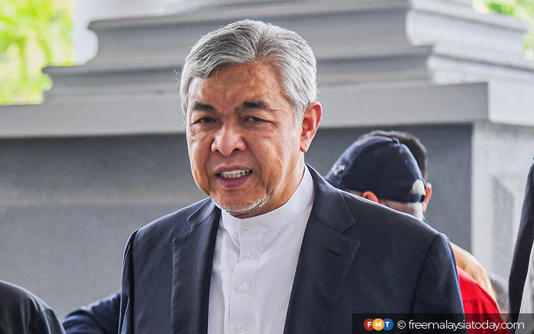The Bersatu president and Perikatan Nasional chairman said a general election now will enable a government that is “capable and free of corruption” to be elected by the people.

SHAH ALAM: Ahmad Zahid Hamidi will know on Friday if he will have to enter his defence to 40 charges of receiving bribes from a company to extend its foreign visa system (VLN) contract.
High Court judge Yazid Mustafa will deliver his decision after having heard 18 witnesses and reviewed 107 exhibits.
Lawyer A Srimurugan said the former deputy prime minister and home minister will be acquitted without his defence being called if the judge finds that the prosecution has failed to establish a prima facie case.
“Zahid will, however, be ordered to enter his defence if the judge finds that the prosecution has proven all elements of the charges,” he said.
Zahid, who is also the Umno president and Bagan Datuk MP, is facing 33 charges of receiving bribes amounting to S$13.56 million (RM42 million) from Ultra Kirana Sdn Bhd (UKSB) as the then home minister to extend the firm’s contract as the operator of a one-stop centre in China and the VLN system as well as to maintain a contract for the supply of the VLN integrated system.
He is also accused of another seven counts of obtaining for himself S$1.15 million, RM3 million, 15,000 Swiss francs and US$15,000 from the same company in connection with his official duties.
He is charged with committing all the offences at Seri Satria in Precinct 16, Putrajaya, and at Country Heights, Kajang, between October 2014 and March 2018.
Lead deputy public prosecutor Raja Rozela Raja Toran said Zahid received the bribes in monthly instalments between 2014 and 2018, adding that UKSB director David Tan had kept a record of all payments in a ledger.
She said the evidence led by the prosecution showed that Zahid had secured for UKSB an extension of the OSC and VLN contracts despite misgivings by ministry officials.
Raja Rozela said a combination of direct, circumstantial and documentary evidence supported the prosecution’s position that a case under Section 16(a)(B) of the MACC Act had been made out against Zahid.
She acknowledged that Tan and two other UKSB directors, Harry Lee and Wan Quoris Shah Wan Abdul Ghani, were Zahid’s accomplices in committing the offences and that the rule of prudence required corroboration of their evidence.
“Their evidence had been corroborated by each other and the ledger was the icing on the cake,” she said.
Raja Rozela also said the money received was a gratification under the MACC Act, and the defence’s attempt to classify it as a political donation did not come to the aid of the accused.
She said the elements of the charges framed under the Penal Code had also been satisfied as Zahid had business dealings with UKSB which was a contractor engaged by the ministry.
She said it also did not matter whether the cash received had its source in Hong Kong or Labuan.
DPP Xander Lim, who is assisting Raja Rozela, told the court that Zahid’s trial had been conducted fairly, and that the accused was represented by competent lawyers and given the right to cross-examine all prosecution witnesses.
However, Zahid’s lead counsel, Hisyam Teh Poh Teik, submitted that his client was the subject of selective prosecution and that the attorney-general, who is also the public prosecutor, had not acted fairly.
He said other politicians and civil servants who also received money from UKSB were not charged.
Hisyam said the testimony of Tan, Lee and Wan Quoris should be rejected as they were not credible witnesses.
“The court must take judicial notice that they were dishonest and contradicted themselves (when) giving evidence,” he said.
He also said the trio had kept UKSB financial controller Fadzil Ahmad in the dark over the ledger that listed out cash payments to politicians, including Zahid.
Lee and Tan had, under cross-examination, also admitted that the money given to Zahid was a political donation, a defence now recognised by the Court of Appeal, he said.
Lawyer Ahmad Zaidi Zainal submitted that the prosecution’s failure to call witnesses from Hong Kong was fatal as it meant that an ingredient of the charges for corruption under both the MACC Act and Penal Code had not been met.




